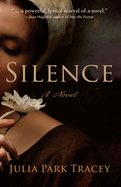
A harrowing story of a community's cruelty and a young woman's resilience, Julia Park Tracey's second novel, Silence, was inspired by the life of her Puritan ancestor.
"There is nothing that can wound me more than the events of the past two years," Silence Marsh reflects. In 1722, she was a happy bride of 20 in her Massachusetts village of Protestant Separatists, but her joy was crushed when her mother, husband, and infant died within a year of one another. Delirious with grief, she cries out "There is no god" at Sabbath worship. Charged with blasphemy, Silence's brutal punishment includes the edict that she be "bound to silence for a twelvemonth." Cruelly, Silence's name becomes her curse. She is consumed by sorrow and shame, which are reinforced by judgmental gossips within her community, whom she dubs "Pilgrim fowl scratching for grit."
As vividly described as Silence's suffering are passages depicting the tenacious Silence's healing time in nature, where she is grateful for "the shore and the sun and the bussing breeze." Her kind father enlists the help of a Boston apothecaress, who provides natural remedies and sends her son, young Dr. Greenleaf, to visit Silence. To her surprise, he graciously offers condolences for her fate, speaks of "an Age of Reason" unfamiliar to her "provincial bog," and prescribes long walks. Dr. Greenleaf renews Silence's spirit, but the town's magistrate is not sated, and accuses her of witchcraft. "This is how they teach us that women are worthless," Silence stubbornly thinks, refusing to be tricked into defending herself. Hard-won joy does find Silence, but her story stands as a cautionary tale of power gone awry. --Cheryl McKeon, Book House of Stuyvesant Plaza, Albany, N.Y.

